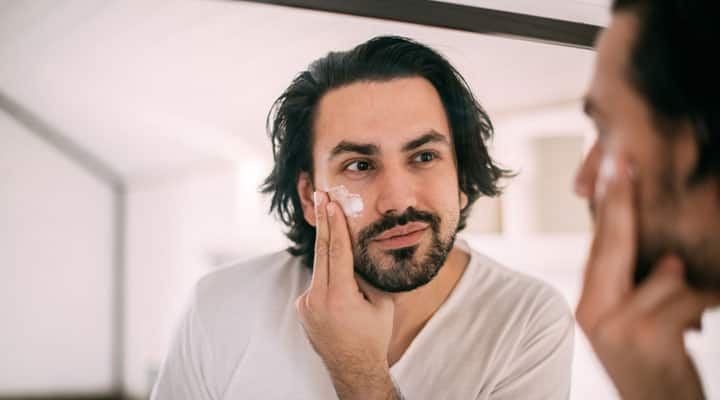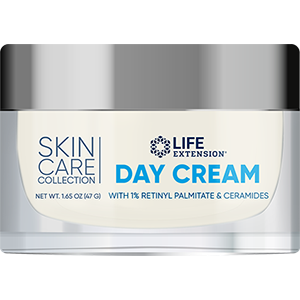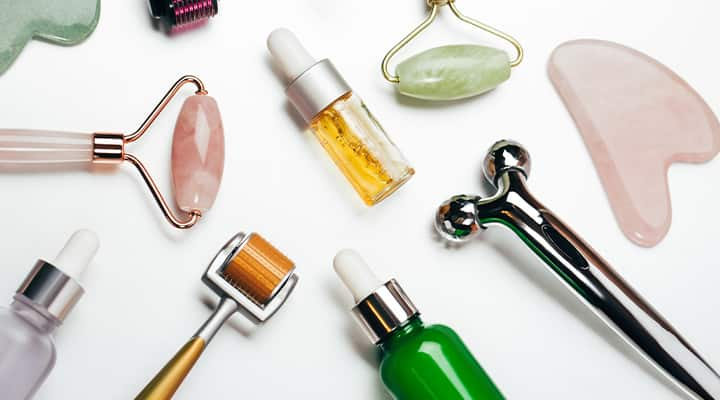
What is Retinyl Palmitate?
Published: May 2021
If you are proactive about your anti-aging skin care routine, and like to stay up to date about the latest and greatest beauty secrets and trends, then you've likely heard of retinol. Retinol is a derivative of vitamin A and the most well-known and important anti-aging skincare ingredient. It is best known for helping support your skin's overall texture, brightness and helps promote against blemishes. But for some, this anti-aging cream can be too powerful for the skin, especially for those with sensitive skin. For a more gentle retinyl, it's time to try the lesser known retinoid, palmitate.
What is the difference between retinyl palmitate vs retinol?

Retinol is often recommended by dermatologists as a skin-support option for those whose skin has become more wrinkled with age, but unfortunately, this powerful cream poses some side effects—especially for those with sensitive skin. It is recommended to start slowly on a retinol regimen, only using a cream one to two times a week until your skin builds up tolerance. For those with sensitive skin, however, even infrequent use may still cause unwanted skin side effects.
But that doesn't mean people of all skin types can't benefit from all that a retinyl has to offer; vitamin A palmitate is the gentlest member of the retinoid family and a great option for those whose skin is easily irritated. Retinyl palmitate is mild, but it still has the power to promote the same skincare benefits a regular retinol would.
What is retinyl palmitate?

There are four different types of retinoids that are used in anti-aging skincare routines, but they all have one thing in common: they are all derived from vitamin A. The most powerful retinoid, retinoic acid, is only available with a prescription from a dermatologist. On the complete opposite end of the spectrum is retinyl palmitate, which is the mildest retinoid and is available in over-the-counter beauty products.
Just because this retinyl is milder does not mean that you can't benefit from this powerful nutrient, however. Retinyl palmitate helps tackle a long list of skincare needs like fine lines, wrinkles, uneven skin tone, rough texture and dark spots. Using a retinyl palmitate regularly also helps naturally boost collagen production to keep your skin firm and smooth.
Regular use of retinyl palmitate will help the cells on the epidermis (the outermost layer of your skin) rapidly rejuvenate, causing older cells to die off to make way for the newer, healthier cell growth underneath. The result: smoother, more radiant skin with more even skin tone.
How do I use a retinyl palmitate?

Even though retinyl palmitate is a milder form of retinyl, that doesn’t mean you should go wild with this skincare product. It is still recommended to introduce it into your skincare routine slowly. Dermatologists recommend starting with one night a week and building up slowly each week, adding an additional night week after week. Follow this advice as much your skin can handle without unwanted side effects. If you start to experience irritation, scale back.
Every person is different, and some are able to use retinyl palmitate every night, while others with very sensitive skin might only be able to handle two to three times a week. Slow and steady wins the anti-aging skincare race when it comes to retinyl palmitate!
Explore Our Best Skin Care Products
When should I use a retinyl palmitate?

If you are thinking about incorporating a retinyl palmitate product, it is best to add this product into your nighttime skincare routine. A little goes a long way, too. You only need a pea-sized amount of product, and it is best to apply after you wash your face, but before you apply a moisturizer.
How quickly does a retinyl palmitate work?

As is the case with any anti-aging skincare products, you won't see results overnight. But, with some dedication, you may start to notice a difference in four to six weeks. Since retinyl palmitate is gentler, it takes a little longer for effects to sink into your skin. A retinyl palmitate regimen will have the best benefits when used in the long term, so make sure you stick with a product to see results.
What are the side effects of a retinyl palmitate?

Remember, retinyl palmitate is the gentlest form of retinyl in the retinoid family, so the side effects should be minimal—and tend to be uncommon. Make sure to speak with your doctor if you do experience side effects—and immediately stop using the product.
Which retinyl palmitate product should I use?
When it comes to a quality retinyl palmitate, turn to Life Extension's Skin Care Collection Night Cream. This premium formula is enhanced with rice bran ceramides, which are lipid molecules that occur naturally in your skin to help retain moisture and inhibit dryness and irritation, leaving you with youthful vibrant, skin.
Another important component of this product is melatonin, which has been shown to support photo-protection. Melatonin also helps protect against oxidative stress and helps promote skin rejuvenation. Continual use of this youth-promoting product is designed to help your skin retain a soft, smooth look and feel.
References
- "Do retinoids really reduce wrinkles?" Harvard Health Publishing, Harvard Medical School, October 2019, https://www.health.harvard.edu/staying-healthy/do-retinoids-really-reduce-wrinkles
- Rud, Melanie. "If Your Skin Can't Handle Retinol, Try Retinyl Palmitate." Byrdie, November 2019, https://www.byrdie.com/retinyl-palmitate-for-skin-4768234
- Whelan, Corey. "Vitamin A Palmitate." Healthline, September 2018, https://www.healthline.com/health/vitamin-a-palmitate
Like what you read?
Please subscribe to get email updates on this blog.





